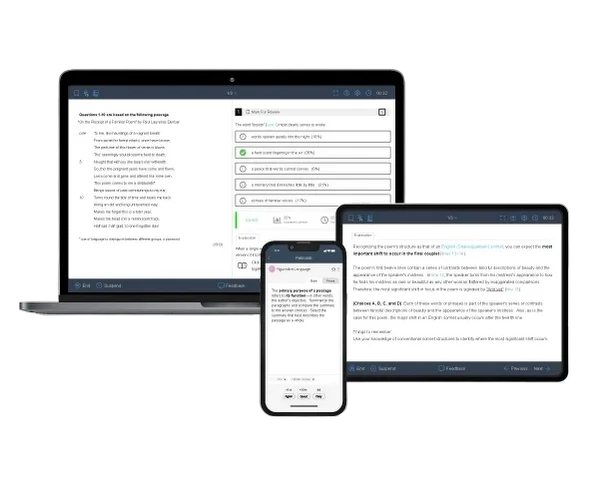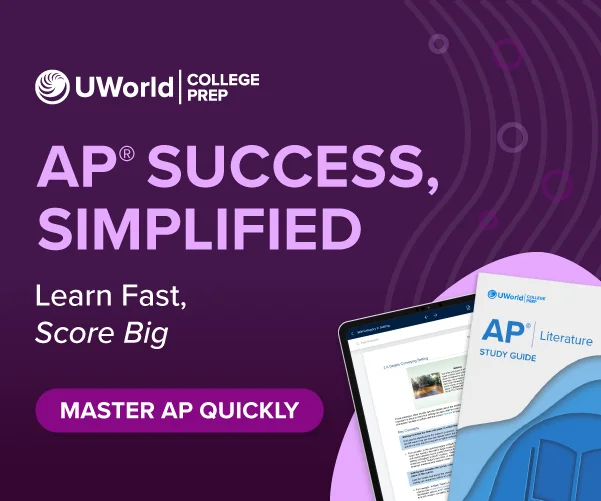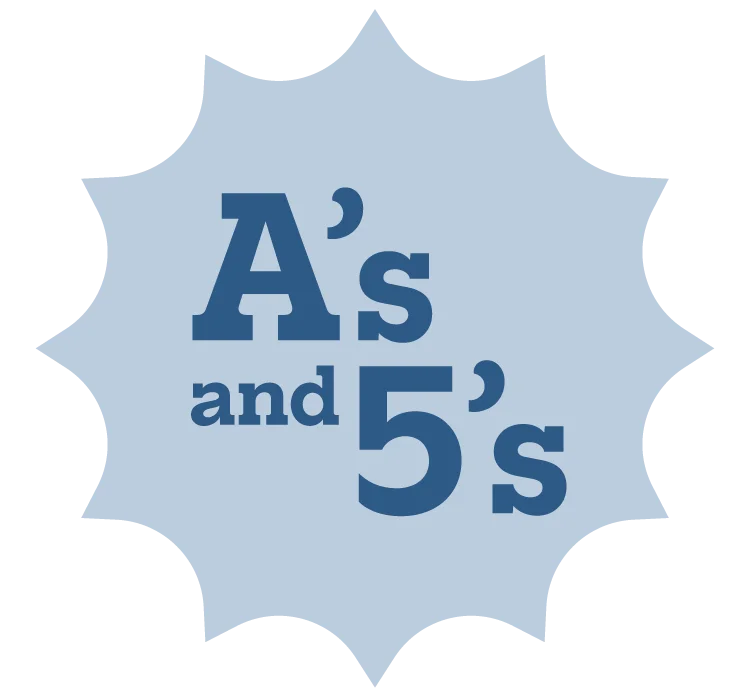The AP® English Literature and Composition exam tests your ability to analyze and interpret complex literary texts at a college level. Throughout the course, you’ll explore key literary elements such as character development, setting, structure, perspective, and figurative language. This guide will help you study efficiently with a structured plan and show you how to do well on AP Literature to reach your dream score.
How To Do Well on the AP Literature Exam
Success on this exam comes from sharpening your reading skills, crafting strong literary arguments, and writing in a clear, structured way. Having a solid understanding of the key literary genres and texts covered in AP English Literature will further enhance your preparation.
What the AP English Literature Exam Covers
The AP English Literature and Composition exam has 2 main sections: multiple-choice questions (MCQ) and free-response questions (FRQ). The MCQ section includes 55 questions to be completed in 1 hour and counts for 45% of your total score. FRQ has 3 essay questions, lasts 2 hours, and makes up 55% of your score.
AP English literature covers 3 main components.
- Short Fiction: Units 1, 4, and 7
- Poetry: Units 2, 5, and 8
- Longer Fiction or Drama: Units 3, 6, and 9
How to Get a Good Score on the AP Lit Exam
To get a good score (3, 4, or 5) on the AP English Literature and Composition exam, you need to develop strong analytical reading and writing skills and familiarize yourself with the exam format. For example, scoring a 3 requires answering about 55% of MCQs correctly and earning at least a 3 or 4 on FRQs. A score of 5 usually demands around 40 correct MCQs and top FRQ scores. To get there, you must focus on reading, writing, and practicing consistently.
- Begin studying over the summer with assigned readings or a classic novel.
- Read poetry regularly, summarizing key ideas to improve analysis skills.
- Learn common literary terms like simile, metaphor, and personification.
- Create a study plan that balances reading, MCQs, and FRQ practice.
- Write well-structured essays with clear thesis statements and strong textual evidence.
- Review high-scoring sample essays and College Board guidelines to refine your writing.
- Avoid last-minute cramming—stick to a 3-month, 1-month, or 2-week study schedule.
AP English Literature Quality Review/Study Materials
Whether you’re taking a course or self-studying AP English Literature, using high-quality study resources will help you prepare effectively. A combination of teacher-led instruction, MCQ practice, and essay writing is key to success.
- Watch strategy videos focusing on the challenges of the MCQ and FRQ sections.
- Practice MCQs using online question banks and study guides, aiming for about 1 minute per question.
- Access past AP Free-Response Questions on the College Board’s website to review prompts, sample essays, and scoring commentaries for better essay preparation.
- Explore online AP communities such as the AP Lit Students Reddit group to swap effective self-study strategies.
- Seek advice from peers who have taken the exam and join online AP communities like the AP Lit Students Reddit group for study tips.
- UWorld AP English Lit question bank for AP-level MCQs with in-depth answer explanations.
- AP Classroom, an online platform from the College Board, offers practice resources and instructional videos.
- The AP Course Description Guide, details exam content, structure, and expectations.
- AP Daily Videos on YouTube, featuring expert instruction on MCQ and FRQ strategies.
- Use quality prep courses such as UWorld’s AP Literature course, which comes with a comprehensive study guide and an extensive question bank to help students achieve their desired scores. UWorld also offers digital study tools such as flashcards, notebooks, a built-in timer, a calculator, and a progress tracker to help students maximize their retention of concepts and keep their performance in check.
AP English Literature Study Plan & Exam Tips
Success in AP English Literature comes from thoughtful reading, analytical writing, and consistent practice. These customized study plans and AP English Lit exam tips will help you stay focused, deepen your understanding, and maximize your performance on test day.
- Begin in February to ensure ample time to cover all units.
- Read and analyze classic and modern short stories.
- Read 1 pre-1900 and 1 post-1900 poem weekly.
- Review novels and plays, focusing on themes, structure, and author’s intent.
- Refresh your understanding using your textbook or UWorld’s prep book.
- Practice 2 sets of MCQs weekly, from prose and poetry.
- Consistently revisit challenging concepts.
- Start timing your MCQs to match exam conditions: Aim for 1 minute per question.
- Review past FRQs from College Board to familiarize yourself with potential essay questions.
- Write an essay weekly using an FRQ prompt from past AP Lit exams.
- Time yourself to adapt to the exam pace.
- Create and review flashcards daily for key formulas and rules.
- Regularly schedule breaks to stay refreshed — plan a day off each week or take an afternoon off when necessary.
- Start with a general review of course topics, unit by unit at a quicker pace.
- Utilize resources such as textbooks, class notes, and course materials for concept refreshers.
- Prioritize completing literature practice questions and using the UWorld QBank two to three times per week for 20-30 minutes per study session.
- With UWorld: To save time, focus on explanations for missed questions, reviewing the concepts that need the most improvement.
- AP English Lit MCQs – 2 Weeks
- AP English Lit FRQs – 2 Weeks
- Use any remaining time to review concepts from each unit you missed to reinforce learning.
Kick off your study by tackling a few UWorld AP English Lit MCQs in each topic to spot the ones that are harder for you. Dive into the explanations for any questions you miss. If you’re still feeling shaky, throw in a video or review your notes on those tough topics. Then, circle back with more UWorld questions to see how much you’ve improved!
Spend most of your week diving into AP English Lit FRQs — they're a great way to cover lots of topics at once and are efficient for review. Plus, they make you show your work, which helps you get a solid handle on the whole problem-solving process.
When to Start Preparing For AP English Literature Exam
| Student Profile-Based Recommendations | ||
|---|---|---|
| Type of Test Takers | Description | Recommended Timeline |
| Busy | Students with busy schedules need a longer prep period but shorter study sessions that fit easily into their routine. | 180 or 360 days |
| Not a Good Test Taker | Students who need to build confidence and familiarity with the exam content | |
| At a Plateau | Students who have difficulty progressing can benefit from practicing challenging questions and improving their approach. | 30 to 90 days |
| Just Getting Started | Students who want to get familiar with the exam format benefit from practicing with real questions and exam-like conditions. | |
| Retaking the Exam | Students who have already pinpointed problem areas and need to improve strategically | |
| Stressed by the Clock | Students who want to get comfortable with time pressure and learn to avoid common trick answers. | 90 to 180 days |
How to Take the AP English Literature Exam with Confidence
Staying calm and well-rested is just as important as studying. Managing stress, taking breaks, and getting enough sleep can help you stay focused and perform your best on exam day.
- Resting between study sessions allows your brain to absorb information more effectively, making studying more productive.
- A full night’s sleep sharpens memory, helping you think clearly and answer complex questions with confidence.
- Laughing reduces stress hormones, making it easier to stay relaxed and retain information. Taking a short break to watch or read something funny can help.
- Deep breathing and mindfulness techniques keep anxiety in check, helping you stay calm and focused under time pressure.
- Staying positive and believing in your preparation reduces stress, giving you the confidence to perform well on test day.

Frequently Asked Questions (FAQs)
Which AP Eng Lit units are the most difficult to learn?
Can you bring books into the AP Lit Exam?
How do I self-study for the AP English Literature Exam?
Read More Related Articles
Answering FRQs can be tough! Our how-to guide will help you approach AP English Literature FRQs. It offers sample questions and strategies to master your exam.
How to Approach AP English Literature MCQsLearn how to approach the correct answer for AP English Literature MCQs.
AP English Literature Scoring GuideCurious about how the AP English Lit exam is scored? Find relevant information on the scoring system, criteria for free credits, and how to use the score calculator.
Best AP English Literature Study Guide ComparisonCompare the best AP English Literature study guides! See how Kaplan, Barron's, and Princeton Review stack up against UWorld for comprehensive exam prep.
Best AP English Literature Prep Course ReviewDiscover the best AP Literature prep courses available. Compare key features, pricings, reviews, and benefits to select the course that best fits your learning.
How to Self-Study for AP English LiteratureWant to ace AP English Literature on your own? Follow this expert self-study guide with tips, tricks, and tools to prepare effectively for the exam.




